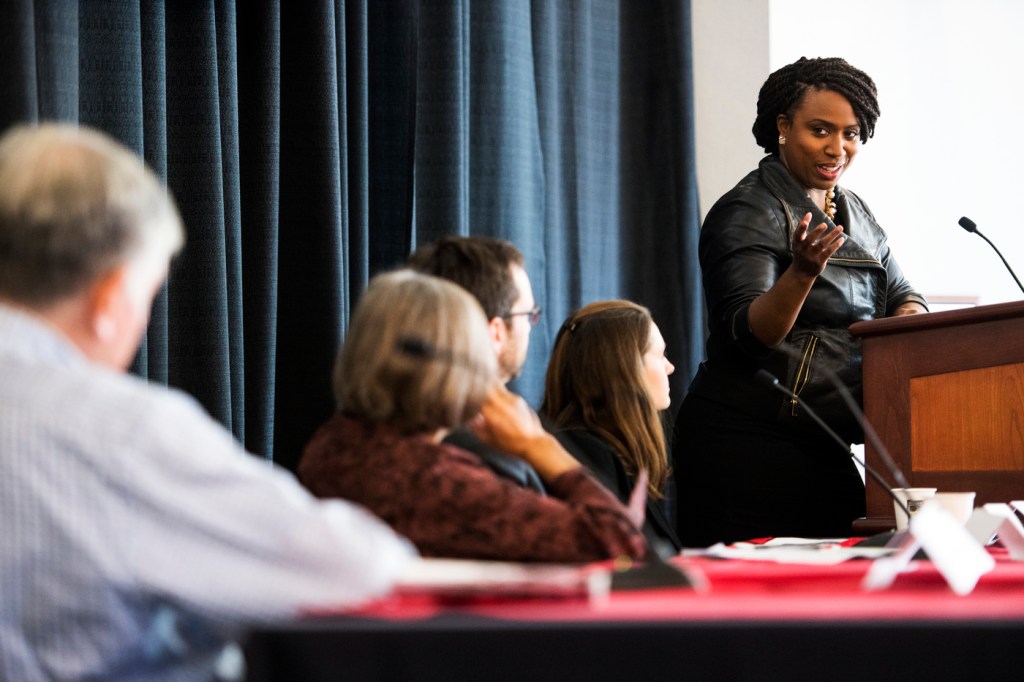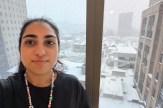Four things we learned about inequity in public transportation

“Public transportation doesn’t work for the people who need it most,” said Mary Skelton Roberts, who works for the Barr Foundation, a philanthropic organization in Boston. Her audience of community activists, city officials and researchers nodded in assent.
That consensus brought them to Northeastern Friday to discuss inequalities in access to public transportation in the Boston area.
Participants in the forum, “Closing the Gaps in a Just City,” also considered ways to improve public transportation for people living in neighborhoods with limited access to reliable travel around Boston.
Here are some of the takeaways from the event:
Race is a predictor of transportation woes
“We have to stop pretending race doesn’t matter,” said Roberts.
Roberts discussed how access to reliable public transportation in Boston and other cities around the globe is disproportionately worse in neighborhoods with large populations of people of color. She said this lack of physical mobility limits economic mobility for people of color who rely on public transportation to get to work.
That sentiment was echoed by Ayanna Pressley, whose recent victory in a primary election in Massachusetts’ seventh congressional district positioned her to be the first black woman to represent the state in Congress.
Pressley said that African American people who use the Massachusetts Bay Transportation Authority system have longer commute times than white riders and spend 66 more hours per year waiting for and riding buses than white riders.
Change should start with buses
“Everything you need to know about the seventh district you can learn on the number one bus that goes from Cambridge to Roxbury,” said Pressley.
She said people who live in Cambridge make an average of $50,000 more per year and live for an average of 30 more years than people who live in Roxbury. The seventh district, which includes half of the city of Boston, is the the most diverse and the most unequal district in the state, she said.
She said riding the bus is often the only option for low-income minorities in her district who live in the gaps between rail lines. She, and others on the panel, said the state’s priority should be making buses more frequent, reliable, and comfortable for riders.
Housing and transportation go hand in hand
Many of the panelists said that adding and upgrading transit options won’t be enough to reduce inequality if the need for affordable housing isn’t addressed.
“People who need transportation justice don’t live in high-opportunity neighborhoods. Transportation needs are directly tied to housing needs,” said Marc Draisen, who directs the Metropolitan Area Planning Council in Massachusetts. “We need to create permanent affordable housing in these centers of opportunity.”
Michael Dukakis, Distinguished Professor of political science at Northeastern, said that some businesses in Boston are unable to fill job vacancies because potential employees are living somewhere without access to the transportation needed to get to work.
Data can be the solution
Northeastern researchers who attended the forum are collecting data about Boston’s infrastructure to better inform city planning.
Geoff Boeing, assistant professor of public policy and urban affairs at Northeastern, is developing software to help the average person to construct and analyze complex street networks in their neighborhoods. He hopes the software will enable disenfranchised people to show city and transportation officials exactly what services they need.
“People close to the pain are the ones that need to be involved in creating the solution,” said Pressley. “This is about so much more than navigating a city, it’s about self-agency and the soul of a city.”
The forum was hosted by the Kitty and Michael Dukakis Center for Urban and Regional Policy at Northeastern.





